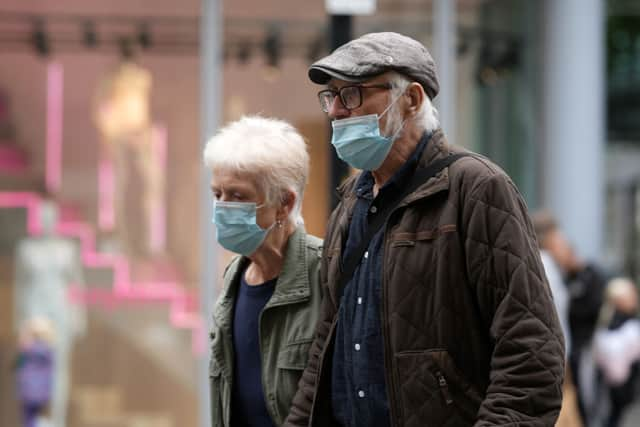‘Worst cold ever’ spreading across UK: how to tell symptoms from Covid - when to get lateral flow or PCR test
This article contains affiliate links. We may earn a small commission on items purchased through this article, but that does not affect our editorial judgement.
and live on Freeview channel 276
With Covid-19 restrictions easing around the UK to varying degrees and people beginning to mingle once again, many have been struck by what has been described as “the worst cold ever”.
This is everything you need to know - and how to tell your common cold symptoms apart from Covid-19.
Advertisement
Hide AdAdvertisement
Hide AdWhy is ‘the worst cold ever’ spreading?
Throughout the Covid-19 pandemic, social distancing and face coverings meant that common illnesses such as the cold were at an all time low, however now that those restrictions have lifted it’s to be expected that the virus is back with a vengeance.
Dr Philippa Kaye, a London-based GP, told the BBC: “We’ve actually been seeing a rise in the number of coughs and colds and viral infections.
“We are mixing in a way that we haven’t been mixing over the past 18 months.
“During those first lockdowns, we saw a number of other [non-Covid] infections fall. We think that was primarily due to the restrictions on meeting up.”
Advertisement
Hide AdAdvertisement
Hide AdOn Twitter, many have reported being struck down by the cold. One tweet appears to sum up the experiences of many, garnering over 15k likes and 1.5k retweets.
It read: “Ok seriously… anyone else been struck down by this non-Covid chest/sinus infection? It’s been 2 weeks and I’m exhausted. Very grateful Miss Rona hasn’t paid me a visit but this is something else. Never been this continually ill before.”
Have our immune systems been affected by lockdown?
Speaking to National World, Martin Michaelis, Professor of Molecular Medicine at the University of Kent, said that it’s unclear as of yet as to how lockdown has impacted our immune systems, saying “we have never experienced anything like this”.
He explained that not only is the immune system “incredibly complex” and in reality our understanding of it is “still limited”, but “we have never had a year like the past one characterised by a drastically reduced level of spread of infectious diseases in general”.
Advertisement
Hide AdAdvertisement
Hide Ad

Although Professor Michaelis said he “would not expect a strongly increased general susceptibility to infectious diseases”, there are particular concerns this year, including “getting the flu vaccine right”.
He also added that the last 18 months “have reduced the ability to accurately predict which influenza virus variants will cause the next winter outbreak”.
How can I tell the difference between the cold and Covid-19?
The most common symptoms of Covid-19 can present very similarly to that of the common cold and the flu, so it can be difficult sometimes to tell the different viruses apart.
While the symptoms overlap, there are a few distinct differences that can help tell them apart.


The NHS says that the three main symptoms of Covid-19 are:
Advertisement
Hide AdAdvertisement
Hide Ad- A high temperature
- A new, continuous cough, which lasts for more than a hour, or three of more coughing episodes in 24 hours
- A loss or change to your sense of smell or taste
If you experience any of these symptoms, you should take a lateral flow or PCR coronavirus test and self-isolate until you have a confirmed negative result.
On the other hand, the main symptoms of the common cold include:
- A blocked or runny nose
- A sore throat
- Headaches
- Muscle aches
- Coughs
- Sneezing
- A raised temperature
- A pressure in your ears and face
The main differences to note is that a blocked or runny nose, sneezing, sore throat and pressure in your ears and face are not typically symptoms of coronavirus.
However, the Delta variant of Covid-19 can result in cold-like symptoms, including a runny nose. If you have this symptom in addition to the three previously listed Covid symptoms, you should isolate and get a test.
Advertisement
Hide AdAdvertisement
Hide AdThe ZOE Covid study identified the following as the main symptoms of the Delta variant:
- A headache
- A sore throat
- A runny nose
- A high temperature
What are the symptoms of the flu?
Flu and coronavirus also share many similar symptoms, making it difficult to spot the difference.
While a high temperature and cough are common symptoms of both, it is unusual for the flu to cause a loss or change to your sense of taste and smell, whereas this is more common of Covid-19.
According to the NHS, the main symptoms of flu include:
- A sudden high temperature of 38C or above
- An aching body
- Feeling tired or exhausted
- A dry cough
- A sore throat
- A headache
- Difficulty sleeping
- Loss of appetite
- Diarrhoea or tummy pain
- Feeling sick and being sick
If you are in doubt whether you have a cold, flu or coronavirus, it is safest to self-isolate and take a lateral flow or PCR test to confirm.
Advertisement
Hide AdAdvertisement
Hide AdHow do I treat the cold?
The NHS says that you can help recover from the cold faster by:
- Resting and sleeping
- Keeping warm
- Drinking plenty of water to avoid dehydration
- Gargle salt water to soothe a sore throat
You can also buy over the counter cough and cold medicines from a pharmacy or supermarket.


You can:
- Ease aches and lower a temperature with painkillers such as paracetamol or ibuprofen
- Relieve a blocked nose with decongestant sprays or tablets
You should see a GP if:
- Your symptoms do not improve after three weeks
- Your symptoms get suddenly worse
- Your temperature is very high or you feel hot and shivery
- You’re concerned about your child’s symptoms
- You’re feeling short of breath or develop chest pain
- You have a long-term medical condition – for example, diabetes, or a heart, lung or kidney condition
- You have a weakened immune system – for example, because you’re having chemotherapy
A message from the editor: Thank you for reading. NationalWorld is a new national news brand, produced by a team of journalists, editors, video producers and designers who live and work across the UK. Find out more about who’s who in the team, and our editorial values. We want to start a community among our readers, so please follow us on Facebook, Twitter and Instagram, and keep the conversation going. You can also sign up to our newsletters and get a curated selection of our best reads to your inbox every day.
Comment Guidelines
National World encourages reader discussion on our stories. User feedback, insights and back-and-forth exchanges add a rich layer of context to reporting. Please review our Community Guidelines before commenting.
